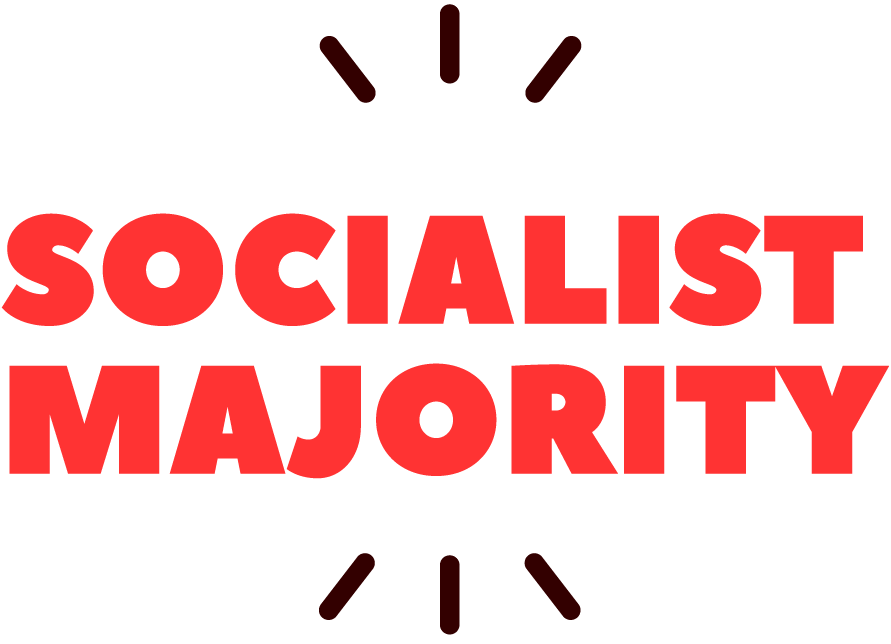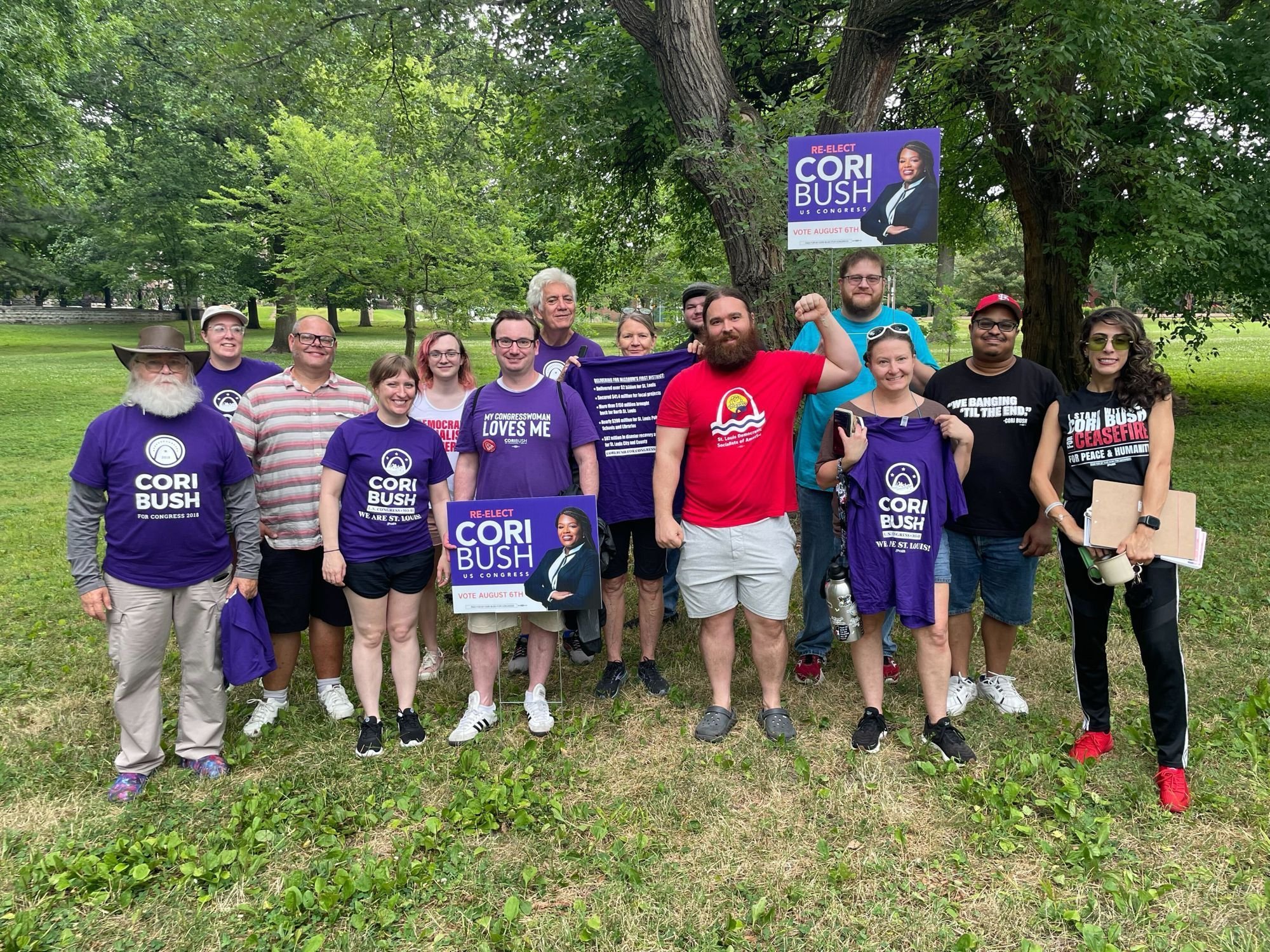Act Like a Nationwide, Mass Socialist Organization: Why I Canvassed for Congresswoman Cori Bush and You Should Too
Some days, it’s hard to top the joy I feel being a member of a national, mass organization fighting for socialism in our lifetimes. That joy reached a new peak the last weekend of June, when I went from Denver to St. Louis to support the DSA chapter in reelecting one of our national DSA electeds and champions for working people, Congresswoman Cori Bush. Congresswoman Cori has been a leading Member of Congress in the fight for a Ceasefire in Gaza and the right to abortion in the US, among many other issues. The fight to keep her in office, coupled with the chapter’s campaign to redistribute wealth for the public good, highlights both the promise of our organization’s project and our collective power. It also shines light on the core responsibility we all hold to affirm and tend to the interdependence of our shared organization and our ties to the broader movement ecosystem.
On the door for a few hours, I had dozens of canvassing conversations with St. Louisans, listening to their calls for housing-first policies, stronger environmental protections, and a real counter to the threat of MAGA fascism. The St. Louis chapter had a follow-up ask to sign a petition in support of their Green New Deal for Public Schools Campaign, which would require the local, incredibly wealthy private university (that also doesn’t pay any property taxes to the city) to fund green social housing, universal pre-k, as well as hazard abatement and the expansion of green spaces for neighborhood public schools. It was inspiring to see how these canvasses were supporting one of our strongest electeds, moving forward a bold chapter campaign, and asserting a powerful vision for a socialist St. Louis.
My drive was 12 hours each way, but I was bolstered by the solidarity of a strong network of DSA comrades throughout the trip. Lawrence DSA comrades fed me and gave me a place to sleep on the way there and back. A Topeka comrade shared snacks and stories with me on the ride from Kansas to Missouri; it was also her first canvass outside of her hometown. A Cori supporter in the 6th Ward where we canvassed ran back to his house to bring us cold waters to help get us through the last quarter of our doors. The St. Louis chapter made sure we were fed and hydrated before and after the canvass. With all of that, it’s hard to miss that we are all part of a larger whole in our organization, and solidarity in practice is what makes the difference.
There’s a lot at stake in this moment, and DSA members have been showing up, as committed organizers tend to do, to shape change and be active agents of history. Choosing to get out from behind a computer screen to connect with comrades in shared struggle is the strongest antidote for despair and its siren song to turn increasingly inward and away from the working class masses. Not long before my trip to Missouri were the New York primaries, where hundreds of us joined the longer term efforts of the NYC chapter to phonebank for Democratic Socialist Congressman Jamaal Bowman. The political terrain, including a new gerrymandered district and an unprecedented nearly 20 million dollars of funding from pro-Israel independent expenditures like AIPAC, was stacked against us. And although we weren’t able to secure his seat for a third term this time, we were able to come together with other organizations fighting for a free Palestine to show we aren’t afraid to fight dark money and the far-right interests they serve. Those same forces have now turned their focus to Congresswoman Cori Bush.
Electoral campaign work is often dismissed as being incapable of shifting consciousness, reducing the dynamic conversations with strangers on the phone and on their doorsteps to brief, fractured interactions. But learning how to connect with people, truly listen to and understand them, and move them into shared action are critical building blocks of organizing in our workplaces, apartment buildings, and communities. We can’t build a base or a mass movement without talking with people. Moreover, our strength as a peoples’ movement comes when we recognize the interdependence at the heart of winning, and when we build relationships of trust that allow us to harness the power of our broad, diverse communities.
One woman I spoke with on the doors in St. Louis asked what was going on with a superfund site in a nearby neighborhood. I couldn’t speak directly to her question, although I was able to connect her to the Congresswoman’s constituent services team. I was able to make a clear, direct connection to her concerns about pollution, environmental racism, and climate justice to the ecosocialist campaign the St. Louis Chapter was running, and how we endorsed and are putting in the work for Cori because she shares our vision for climate justice. The woman I spoke to said that answered her question, signed the petition, and wanted to know how to join DSA. When we can connect our visions for a better world and show a clear path to winning the world, we’re better able to invite people to walk the road to that horizon with us.
Some try to present as a foil to electoral work the idea that true power lies in harnessing the movement of the streets. It is absolutely true that moments of uprisings and mass mobilizations are significant touchpoints. Part of being organized means being prepared to reinforce movement moments when they crest, in part because we’ve already been in motion, contributing to the build. Studying movements like Occupy, or the 2020 George Floyd Uprisings, or the many global examples from the 2010s onward show that mass mobilization in the street does not deliver material change on its own. It requires demands, organization, leaders who can ensure our demands and message are clear, and control over the institutions we want to transform to effect that change. We want more than painted murals and crosswalks paying tribute to our movements, we demand lasting change.
Congresswoman Cori Bush is a strong example of a DSA elected, and she more than deserves her flowers. A leader from the 2014 and 2015 Ferguson Uprising, she became the first Black woman from Missouri elected to the House when she upset a ten-term incumbent in 2020. She’s been unapologetic and firm on the issues of Palestinian liberation and ending the genocide, authoring the resolution for a ceasefire that, with support from our No Money For Massacres phonebank mobilizations, gained 19 sponsors in the House and many more of our targets to release public statements calling for a ceasefire. She’s spoken publicly about the abortions she’s had and authored a resolution to repeal the Comstock Act, a 19th century law which could be used by the Right to impose a nationwide abortion ban. She occupied the steps of Congress to extend the eviction moratorium in 2021, and released an Unhoused Bill of Rights, having herself been unhoused and experienced housing insecurity.
There has been much discussion in our organization of what accountability means in regards to our relationships with electeds. In DSA, the logic of these relationships has often focused on deficiency and punishment, a one-sided transaction in which electeds are expected to carry out our agenda, however inexact or fluid that agenda may be. Should they fail to do so, and, according to this line of thinking, they almost certainly will, a cost must be exacted. Typically this means the severing of ties and marking that elected with a public distinction as no longer belonging within the good graces of our group. This approach, although it is an honest attempt to hold fast to our political principles, neglects much about the material reality of what conditions make it possible for electeds to successfully wield power. It is a strategy that in effect reduces our numbers, atrophies our ties, and extinguishes opportunities to bring more people into the fold.
We must organize a significant mass of electeds, a time-intensive project that can’t be determined from one or a couple of election cycles. Much like a lone activist worker is easily isolated when challenging the status quo in their workplace, we need a large enough mass of electeds able to stand together and challenge the backlash that often comes from standing up for our people and our principles. Our electoral work is bearing promising fruit. Despite Bowman’s loss in June, the NY Socialist Slate grew overall and is now one elected away from being the state’s largest socialist legislative caucus office in US history. Our New York chapters Socialist in Office (SiO) work has forged a path forward in leveraging state power to win real change. The Not on Our Dime Bill, authored by DSA NY State Electeds Zohran Mamdani and Jabari Brisport and backed by DSA electeds from across the state, would end the non-profit status for groups that expand Israel’s illegal settlements and commit other human rights abuses.
Accountability isn’t just something electeds do for us. Accountability has to be reciprocated. It means us, too - we have a responsibility to show up and create the conditions for electeds to wield power. Our Socialists in Office need backup from us, their constituencies and base communities, when those attacks inevitably come. The reaction of right-wing donors and interests pouring in money and resources to defeat DSA endorsed-electeds like Cori Bush and Jamaal Bowman leaves no room for doubt: our electoral project poses a credible threat to the global Right’s interests and the status quo.
We don’t need to reinvent a new path for our organization - chapters like St. Louis and New York and electeds like Congresswoman Cori Bush are lighting the way. Rather than pitting the energy of protests and street mobilizations against winning and wielding state power, we can find symbiosis to win our socialist horizon. Representative Bush, who was part of the Ferguson movement and is now a Socialist in Office shows this is achievable. The path we need requires owning our interconnectedness and shared responsibility. We must be accountable to our movement and to each other. To ensure we can keep fighting and building, we must first show up. And it feels joyful, energizing, and good to do it. Will you show up to fight for our vision of a socialist future against some of the most formidable villains of our time? Will you show up and put our organization into action?
If you’d like to go to St. Louis and canvas for Cori and St. Louis’s Green New Deal for Public Schools, you can sign up here.
If you’d like to phonebank on Tuesdays in July to support Cori, sign up here:
7/23 5-7pm CT: https://actionnetwork.org/events/cori-phones-240723
7/30 5-7pm CT: https://actionnetwork.org/events/cori-bush-phone-bank-with-dsa-3

